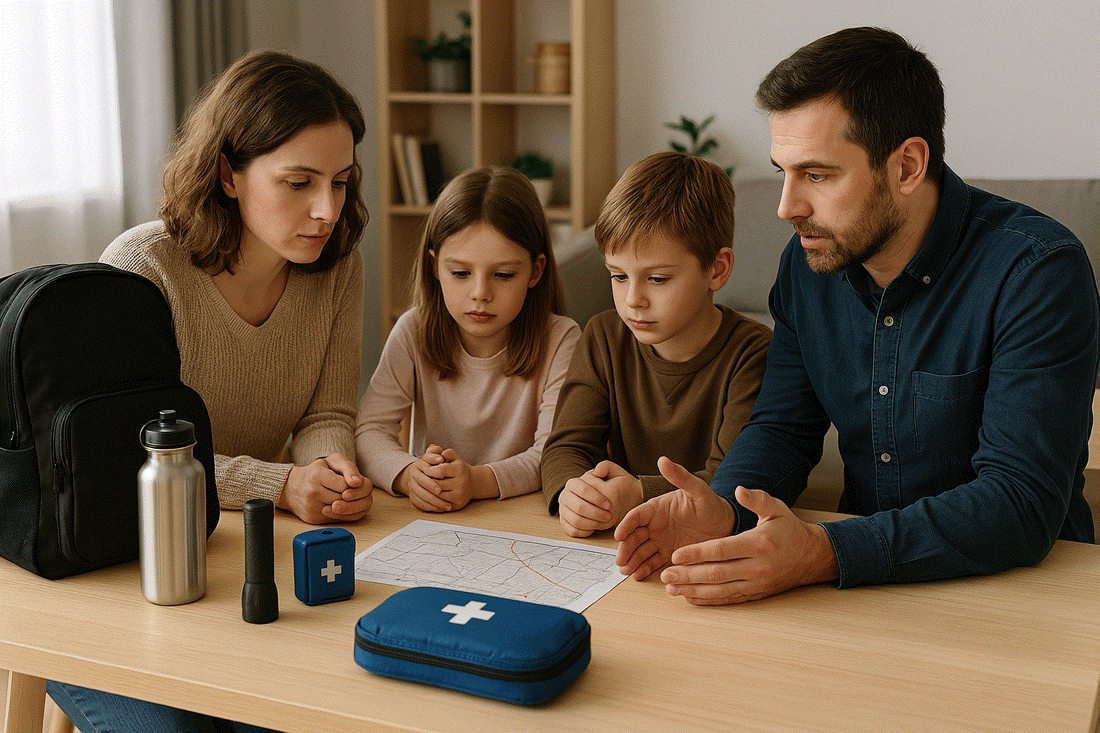
De Psychologie van Voorbereiding: Waarom Gezinnen Noodplanning Uitstellen
Share
We All Know We Should Be Prepared. So Why Aren’t We?
In 2025, with the rise in climate-related disasters, infrastructure instability, and growing geopolitical tensions, the concept of emergency preparedness has never been more relevant in Europe. Governments and institutions are issuing more frequent alerts, and recommendations such as having a 72-hour emergency kit have become part of official communications.
And yet—most European families remain underprepared.
Statistically, over 70% of households across the EU do not have a clear emergency plan, nor the minimum essentials to face a disruption in basic services such as electricity, water, or internet. The problem is not a lack of information. Most people are aware that emergencies can happen. The problem lies elsewhere—in how we think, feel, and react to risk.
This article explores the invisible barriers that keep families from taking action, and how understanding them can help overcome inertia and move toward real readiness.
1. The Illusion of Control
One of the most common psychological traps is the illusion of control—the belief that, when something goes wrong, we’ll be able to improvise. We trust our instincts, our ability to make fast decisions, and our resilience. But in real emergency situations, stress levels spike and clear thinking often vanishes.
Most people overestimate their ability to respond effectively in a crisis. In truth, without a pre-established plan or basic equipment, families lose precious time—and that time can be critical.
Preparation is not paranoia. It’s structure. It’s giving your future self the tools to act quickly, not just react chaotically.
This is where a simple, pre-assembled 72-hour kit becomes not just helpful—but essential.
2. Optimism Bias: “It Won’t Happen to Me”
Humans have a powerful psychological filter known as optimism bias. We tend to believe that bad things happen to others, not to us. Even when we live in areas prone to flooding, storms, or blackouts, we often push the thought aside. “I’ll deal with it later.”
This subconscious belief is comforting—but dangerous. Emergencies don’t announce themselves in advance. They demand instant decisions. Being prepared isn’t a luxury. It’s a civic responsibility, especially when others depend on us.
Reframing the situation helps: you’re not preparing for you alone—you’re preparing for your family. Their safety is your priority. Action becomes a form of protection, not just precaution.
3. Beslissingsmoeheid en Overbelasting
Een van de meest over het hoofd geziene redenen waarom mensen noodplanning uitstellen, is simpelweg mentale uitputting. Tussen werk, opvoeding, rekeningen en het dagelijkse lawaai van het moderne leven, hebben maar weinig mensen de mentale ruimte om alles te onderzoeken, vergelijken en samenstellen wat ze mogelijk nodig hebben in een crisissituatie.
Dit fenomeen staat bekend als beslissingsmoeheid—wanneer het brein zo overbelast is dat zelfs eenvoudige taken overweldigend aanvoelen.
Het resultaat? Geen actie. Of eindeloze “Ik doe het morgen wel”-loops.
Directive72 is precies opgericht om dit probleem op te lossen. Dankzij zorgvuldig samengestelde keuzes door experts en een snel configuratieproces wordt de keuzestress weggenomen. Het is eenvoudig, snel en klaar in enkele minuten.
Je hoeft geen survivalexpert te worden. Je hebt gewoon een plan nodig.
4. Angst en Vermijding
Over noodsituaties praten betekent het onder ogen zien van ongemak: kwetsbaarheid, gevaar, zelfs de dood. Daarom vermijden veel mensen liever het onderwerp volledig. Maar vermijding doet het risico niet verdwijnen—het vergroot het.
Er is hier een krachtig paradox: hoe meer je je voorbereidt, hoe minder angst je voelt. Actie is een vorm van mentale opluchting. Het verandert vage ongerustheid in concrete stappen.
Zoals psycholoog Tim Pychyl zegt: “Actie is het tegengif voor angst.”
Klein beginnen—zoals het samenstellen van een 72-uur-kit—is niet alleen een logistieke beslissing. Het is een psychologische mijlpaal. Het zegt: “Ik ben er klaar voor.”
5. De Gezinsfactor: De Verborgen Motivatie
Wanneer mensen alleen voor zichzelf voorbereiden, voelt de urgentie vaak abstract aan. Maar als er kinderen, partners of oudere familieleden bij betrokken zijn, verandert alles. Verantwoordelijkheid treedt op. De emotionele motivatie wordt sterker—en blijvender.
Daarom zijn de meest effectieve voorlichtingscampagnes rond noodplanning gericht op gezinnen. Ze gaan niet over angst. Ze gaan over bescherming, vooruitdenken en zorg.
Je hoeft niet extreem te zijn. Je hoeft alleen verantwoordelijk te zijn.
Conclusie – Van Uitstel naar Actie: 5 Minuten Is Genoeg
De meeste gezinnen stellen noodplanning uit om diep menselijke redenen: overmoed, optimisme, vermoeidheid, angst. Deze mentale patronen begrijpen, helpt ze te doorbreken.
Het goede nieuws? Voorbereiding vereist geen wekenlange planning. Het vraagt één bewuste beslissing—nu meteen.
Je hebt geen bunker nodig. Alleen een plan.
Met Directive72 stel je je noodkit samen in minder dan 5 minuten. Geen stress. Geen overdenken. Alleen gemoedsrust.


